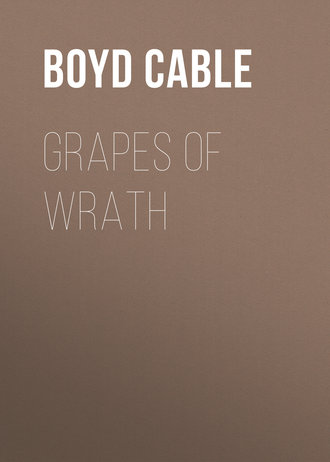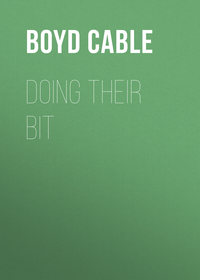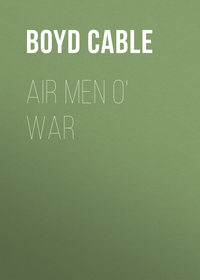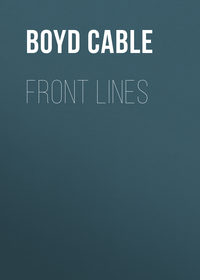
Grapes of wrath
“Wot’s that they’re shoutin’ along there?” said Pug anxiously. “Strewth!” and he gasped a deep breath and grabbed hurriedly for the bag slung at his side. “Gas … ’Helmets on,’ they’re shoutin’.”
Through the acrid odors of the explosives’ fumes Kentucky caught a faint whiff of a heavy, sickly, sweet scent. Instantly he stopped breathing and, with the other three, hastily wrenched out the flannel helmet slung in its special bag by his side, pulled it over his head, and, clutching its folds tightly round his throat with one hand, tore open his jacket collar, stuffed the lower edge of the flannel inside his jacket and buttoned it up again. All four finished the oft-drilled operation at the same moment, lay perfectly quiet, inhaling the pungent odor of the impregnated flannel, and peering upward through the eye-pieces for any visible sign of the gas.
They waited there without moving for another five minutes, with the shells still pounding and crashing and hammering down all round them. Pug leaned over and put his muffled mouth close to Kentucky’s ear: “They got a dead set on us here,” he shouted. “Looks like our number was up this time, an’s if they meant to blow this trench to blazes.”
Kentucky nodded his cowled head. It did look as if the German gunners were determined to completely obliterate that portion of the trench, but meantime – it was very ridiculous, of course, but there it was – his mind was completely filled with vague gropings in his memory to recall what perfume it was that the scent of the gas reminded him of. He puzzled over it, recalling scent after scent in vain, sure that he was perfectly familiar with it, and yet unable to place it. It was most intensely and stupidly irritating.
The shell fire worked up to a pitch of the most ferocious intensity. None actually hit the portion of trench the four were in, but several came dangerously close in front, behind, and to either side of them. The wall began to crumble and shake down in wet clods and crumblings, and at the burst of one shell close out in front, a large piece broke off the front edge and fell in, followed by a miniature landslide of falling earth. The trench appeared to be on the point of collapsing and falling in on them.
“We gotter move out o’ this!” shouted Pug, “else we’ll be buried alive.”
“What’s the good of … don’t believe there’s any one left but us … better get out of it,” said the man Jim. His voice was muffled and indistinct inside his helmet, but although the others only caught fragments of his sentences his meaning was plain enough. The four looked at each other, quite uselessly, for the cowl-like helmets masked all expression and the eyes behind the celluloid panes told nothing. But instinctively they looked from one to the other, poking and twisting their heads to bring one another within the vision range of the eye-pieces, so that they looked like some strange ghoulish prehistoric monsters half-blind and wholly horrible. Jim’s companion mumbled something the others could not hear, and nodded his shapeless head slightly. His vote was for retirement, for although it had not been spoken, retirement was the word in question in the minds of all. Kentucky said nothing. True, it appeared that to stay there meant destruction; it appeared, too, that the Stonewalls as a fighting force must already be destroyed … and … and … violets! was it the scent of violets? No, not violets; but some flower…
Pug broke in. “There’s no orders to retire,” he said. “There’s no orders to retire,” and poked and turned his head, peering at one after the other of them. “We carn’t retire when there ain’t no orders,” waggling his pantomimic head triumphantly as if he had completely settled the matter. But their portion of trench continued to cave in alarmingly. A monster shell falling close out on their right front completed the destruction. The trench wall shivered, slid, caught and held, slid again, and its face crumbled and fell in. The four saw it giving and scrambled clear. They were almost on the upper ground level now, but the hurried glances they threw round showed nothing but the churned up ground, the drifting curling smoke-wreaths, tinted black and green and yellow and dirty white, torn whirling asunder every few moments by the fresh shell bursts which in turn poured out more billowing clouds. No man of the Stonewalls, no man at all, could be seen, and the four were smitten with a sudden sense of loneliness, of being left abandoned in this end-of-the-world inferno. Then the man Jim noticed something and pointed. Dimly through the smoke to their left they saw one man running half doubled up, another so stooped that he almost crawled. Both wore kilts, and both moved forward. In an instant they disappeared, but the sight of them brought new life and vigor to the four.
“The Jocks that was on our left,” shouted Pug, “gettin’ outer the trench into shell-holes. Good enough, too. Come on.”
They did not have far to seek for a shell-hole. The ground was covered with them, the circle of one in many cases cutting the circle of the next. There were many nearer available, but Pug sheered to his left and ran for the place he had seen the two Highlanders disappear, and the others followed. There were plenty of bullets flying, but in the noise of shell-fire the sound of their passing was drowned, except the sharp, angry hiss of the nearer ones and the loud smacks of those that struck the ground about them.
They had less than a dozen yards to cover, but in that short space two of them went down. Jim’s companion was struck by a shell splinter and killed instantly. Pug, conscious only of a violent blow on the side, fell, rolling from the force of the stroke. But he was up and running on before Kentucky had well noticed him fall, and when they reached the shell-hole and tumbled into it almost on top of the two Highlanders there, Pug, cautiously feeling round his side, discovered his haversack slashed and torn, its contents broken and smashed flat. “Fust time I’ve been glad o’ a tin o’ bully,” he shouted, exhibiting a flattened tin of preserved meat. “But I s’pose it was the biscuits that was really the shell-proof bit.”
“Are you hurt at all?” said Kentucky. “Not a ha’porth,” said Pug. “Your pal was outed though, wasn’t ’e, chum?”
The other man nodded. “… cross the neck … ’is ’ead too … as a stone…”
“You’re no needin’ them,” said one of the Highlanders suddenly. “It’s only tear-shells – no the real gas.”
The others noticed then that they were wearing the huge goggles that protect the eyes from “tear,” or lachrymatory shells, and the three Stonewalls exchanged their own helmets for the glasses with huge relief.
“What lot are you?” said one of the Scots. “Oh, ay; you’re along on oor right, aren’t ye?”
“We was,” said Pug; “but I ’aven’t seen one o’ ours since this last shell strafin’ began. I’m wondering if there’s any left but us three. Looks like our trench was blotted out.”
But on that he was corrected swiftly and dramatically. The pouring shells ceased suddenly to crash over and about them, continued only to rush, shrieking and yelling, high above their heads. At the same moment a figure appeared suddenly from the ground a little in front of them, and came running back. He was passing their shelter when Kentucky recognized him as the officer who earlier had moved along the trench to go out in front and establish a listening post. He caught sight of the little group at the same moment, swerved, and ran in to them. “Look out,” he said; “another attack coming. You Stonewalls? Where’s our trench? Further back, isn’t it?”
“What’s left of it, sir,” said Kentucky. “Mighty near blotted out, though.”
“Open fire,” said the officer. “Straight to your front. You’ll see ’em in a minute. I must try’n find the others.”
But evidently the word of warning had reached the others, for a sharp crackle of rifle fire broke out along to the right, came rattling down towards them in uneven and spasmodic bursts. The men in the shell-hole lined its edge and opened fire, while the officer trotted on. A dozen paces away he crumpled and fell suddenly, and lay still. In the shell-hole they were too busy to notice his fall, but from somewhere further back, out of the smoke-oozing, broken ground, a couple of figures emerged at the double, halted by the limp figure, lifted and carried it back.
“There’s still some of us left,” said Pug, cheerfully, as they heard the jerky rifle fire steady down and commence to beat out in the long roll of independent rapid fire.
“Not too many, though,” said Kentucky anxiously. “And it took us all our time to stand ’em off before,” he added significantly. He turned to the two Highlanders, who were firing coolly and methodically into the thinning smoke. “Can you see ’em yet?”
“No,” said one, without turning his head; “but we’ve plenty cairtridges … an’ a bullet gangs straight enough withoot seein’.” And he and the other continued to fire steadily.
Then suddenly a puff of wind thinned and lifted the smoke cloud, and at the same instant all saw again that grim gray wall rolling down upon them. The five rifles in the pit crashed together, the bolts clicked back, and the brass cartridge-cases winked out and fell; and before they had ceased to roll where they dropped the five rifles were banging again, and the five men were plying bolt and trigger for dear life. Behind them and to the right and left other rifles were drumming and roaring out a furious fire, and through their noise rose the sharp tat-tat-tat-tat of the machine guns. The British artillery, too, had evidently seen their target, the observers had passed back the corrections of range and rapid sequence of orders, and the bellowing guns began to rake and batter the advancing mass.
But this time they had an undue share of the work to do. For all the volume and rapidity of the infantry fire, it was quickly plain that its weight was not nearly as great as before, that the intense preparatory bombardment had taken heavy toll of the defenders, that this time the attack had nothing like the numbers to overcome that it had met and been broken by before. Again the advancing line shredded and thinned as before under the rifle and shell fire, but this time the gaps were quicker filled; the whole line came on at greater speed. In the pit the five men shot with desperate haste, but Kentucky at least felt that their effort was too weak, that presently the advancing tide must reach and overwhelm them. Although other shell-holes to right and left were occupied as theirs was they were slightly in advance of the ragged line, and must be the first to be caught. There was nothing left them apparently but to die fighting. But if the others saw this they gave no sign of it – continued merely to fire their fastest.
One of the Highlanders exclaimed suddenly, half rose, and dropped again to his knees. The blood was welling from a wound in his throat, but as his body sagged sideways he caught himself with a visible effort, and his hands, which had never loosed their grip on the rifle, fumbled at the breech a moment, and slipped in a fresh clip of cartridges. He gulped heavily, spat out a great mouthful of frothy blood, spoke thickly and in gasps, “Hey, Mac … tak’ her, for … the last. The magazine’s full …” And he thrust out the rifle to the other Scot with a last effort, lurched sideways, and slid gently down in the bottom of the pit. The other man caught the rifle quickly, placed it by his side, and resumed firing. The others never ceased for a moment to load and fire at top speed. Plainly there was no time to attend to the dead or wounded when they themselves were visibly near the end the other had met.
The German line was coming in under the guard of the shells that the gunners dared not drop closer for fear of hitting their own line. The rifles were too few to hold back the weight of men that were coming in now in a scattered rush.
Pug cursed wrathfully. “I do b’lieve the blighters is goin’ to get in on us,” he said; and by his tone one might suppose he had only just realized the possibility; was divided between astonishment and anger at it. Kentucky, who had looked on the possibility as a certainty for some little time back, continued to pick a man of the advancing line, snap-shoot hurriedly at him, load and pick another target. And away somewhere in the back of his mind his thoughts worked and worried at the old, irritating puzzle – “Lilies, no; but something like them … heavy, sweetish … not lilies … what other flower, now …”; Jim, the third Stonewall, glanced back over his shoulder. “Why can’t them fellows back there shoot a bit quicker?” he said irritably. “They’ll have this lot a-top o’ us if they don’t look out.” Kentucky, his fingers slipping in a fresh cartridge-clip, his eye singling out a fresh mark, was slightly amused to notice that this man, too, seemed surprised by the possibility of the Germans breaking through their fire; and all the while “… lilac, stocks, honeysuckle, hyacinth … hyacinth, hyacinth, no …”; the Scot lifted the dead man’s rifle and put it on the ledge at his right elbow.
“Strewth,” said Pug, with confident cheerfulness. “Won’t our chaps make them ’Uns squeal when they gets close enough for the baynit?”
The shells continued to rush and scream overhead, and burst in and over the mass of the attackers. But the front line was well in under this defense now, scrambling and struggling over the broken ground. The nearest groups were within thirty to forty yards.
They were near enough now for the bombers to come into play, and from the scattered shell-holes along the British line little black objects began to whirl and soar out into the air, and the sharp crashes of the exploding Mills’ grenades rose rapidly into a constant shattering series that over-ran and drowned out the rolling rifle fire. The ground out in front belched quick spurts of flame and smoke, boiled up anew in another devil’s cauldron of destruction.
The advancing Germans were for the moment hidden again behind the swirling smoke bank, but now they too were using their bombs, and the stick-grenades came sailing out of the smoke; curving over, bombing down and rolling or bucketing end over end to burst about the British line. One fell fairly in the shell-crater beside Kentucky, and he had only bare time to grab at it, snatch it up and fling it clear before it burst. And yet, even as he snatched half expecting the thing to go off in his hand, his mind was still running on the memory quest after the elusive name of that scent he had forgotten.
The German line emerged from the smoke, raggedly but yet solidly enough to overwhelm the weakened defense. Plainly this was the end.
“Roses,” said Kentucky, suddenly and triumphantly. “Roses – tuberoses. That’s it exactly.”
CHAPTER XI
FORWARD OBSERVING
Among the stock situations of the melodrama, one of the most worked to death is that of the beleaguered garrison at the last gasp, and the thrilling arrival of the rescuing force at the critical moment. It is so old and threadbare now that probably no theater would dare stage it; but in the war the same situation has been played again and again in the swaying and straining lines of battle in every variety of large and small scale. What the theater has rejected as too theatrical, the artificial as too artificial, the real has accepted as so much a commonplace that it is hardly remarked. Actually the battle line is one long series of critical situations on one side or the other, the timely arrival, or failure to arrive, of assistance at the critical moment. The great difference is that in the theater the rescue never fails to arrive, in war it often does.
Certainly the Stonewalls were as near the last gasp as ever dramatist would dare bring his crisis; but when their rescue came they were too busy helping it, too busy pushing the Germans back into what they hoped would be a similar unpleasant situation (without the timely rescue) to bother about it being a “dramatic situation” at all.
The Scot and the three Stonewalls shooting from the shell crater a little in front of the thin and scattered line were close enough to the front groups of the advancing German line to distinguish the features of the men’s faces, when they were suddenly aware that the groups were going down: were vanishing from before their eyes, that the charging line came no nearer, that its front, if anything, receded. The front lines were being cut down now faster than they could advance, and the lines which fell dropped out of the low vision line of the defenders, and were hidden in the low-hanging smoke haze and in the welter of shell-pits, furrows, and heaps of earth over which the advance moved. The sound of the rifle fire swelled suddenly and heavily; the air grew vibrant with the hiss and zipp of bullets.
The four in the shell pit continued to give all their attention to rapid shooting until the sound of running footsteps and shouting voices made them turn. All along the line to right and left of them they could see figures running forward in short rushes, halting to fire, running on again, dropping into holes and opening a rapid fire from their cover. Into the pit beside the four tumbled three men one after another, panting and blowing, but shouting and laughing. “Cheer oh, mates,” called one. “Give us a bit o’ room on the front edge there, will you?” Each of the three carried some burden. They clustered closely together a moment, but with a delay of no more than seconds stood up and began to hoist into position on the pit’s edge a light machine gun. “Let ’er rip, Bill,” said one, who wore the tunic of an officer; and Bill, crouching behind his gun, started to “let ’er rip” in a stream of fire jets and clattering reports.
“You boys were pretty near the limit, eh?” said the officer. “Mighty near,” said Kentucky; “you just sat into the game in time to stop ’em scooping the pool, sir.”
“Hey, Chick, get a move on wi’ that loadin’ there,” said Bill; “you’re hardly keepin’ the ol’ coffee mill grindin’.”
“You’re Anzacs, ain’t you?” said Pug, noticing the shirt-tunic the officer wore. Bill was bare-headed; Chick wore a metal helmet crammed down on top of his slouch hat.
“That’s what,” said Chick, feverishly busy with his loading. “What crowd are you?”
“Fifth Sixth Stonewalls,” said Pug.
“You was damn near bein’ First ’n’ Last Stone-colds this trip,” said Chick. “Good job we buzzed in on you.”
A few yards away another machine gun, peering over the edge of a shell crater, broke out in frantic chattering reports.
“That’s Bennet’s gun, I expect,” said the officer; “I’ll just slide over and see how he goes. Keep her boiling here, and mind you don’t move out of this till you get the word.”
Chick nodded. “Right-oh!” he said, and the officer climbed out of the hole and ran off.
For another minute or two the machine gun continued to spit its stream of bullets. “They’re breaking again,” said Kentucky suddenly; “my Lord, look how the guns are smashing them.”
The attack broke and fell back rapidly, with the running figures stumbling and falling in clusters under the streaming bullets and hailing shrapnel. In less than half a minute the last running man had disappeared, the ground was bare of moving figures, but piled with dead and with those too badly wounded to crawl into cover.
“First round to us,” said Bill cheerfully, and cut off the fire of his gun. “An’ last move to a good many o’ them blokes out there,” said Chick; “they fairly got it in the neck that time. I haven’t seen such a bonzer target to strafe since we was in G’llipoli.”
“Is there many o’ you chaps here?” said Pug. “Dunno rightly,” said Chick, producing a packet of cigarettes. “’Bout time for a smoke-oh, ain’t it, Bill?”
“I’m too blame dry to smoke,” said Bill. “Wonder wot we’re waitin’ ’ere for now. D’you think the other battalions is up?”
“Have you heard anything about how the show is going?” said Kentucky.
“Good-oh, they tell us,” said Chick. “We saw a big bunch o’ prisoners back there a piece, an’ we hear there’s two or three villages taken. We came up here to take some other village just in front here. I s’pose they’ll loose us on it presently.”
There was a short lull in the gunfire, and the noisy passage of the shells overhead slowed down. A shout was heard: “Close in on your right, Stonewalls. Rally along to the right.”
“Hear that?” said Pug, “there is some Stonewalls left, then. Blimey, if I wasn’t beginnin’ to think we was the sole survivors.”
“We’d best move along,” said Kentucky, and the three made ready. “Well, so long, mates,” said Chick, and “See you in Berlin – or the nex’ world,” said Bill lightly.
“To your right, Stonewalls; close to your right,” came the shout again, and the three clambered out of their hole and doubled in across the torn ground to their right. There were other men doing the same, stooped low, and taking advantage of any cover they found, and gradually the remains of the battalion gathered loosely together, in and about the remains of the old trench. Pug and Kentucky anxiously questioned every man they met as to whether they had seen anything of Larry Arundel, but could get no tidings of him. The battalion was rapidly if roughly sorted out into its groups of companies, and when this was done and there were no signs of Larry, little could be concluded but that he had been killed or wounded. “He’d sure have been looking for us,” said Kentucky; “I’m afraid he’s a wash-out.” “Looks like it,” said Pug sadly. “But mebbe he’s only wounded. Let’s hope it’s a cushy one.”
The guns were opening behind them again, and bombarding with the utmost violence a stretch of the ground some little distance in front. “It’s a village we’re to take,” one of the sergeants told them. “That was our objective when the German counter-attack stopped us. We were to attack, with the Anzacs in support. Suppose we’re going on with the original program; but we’re pretty weak to tackle the job now. Hope the Jocks on the left didn’t get it too bad.”
“Should think we was due for a bit of an ease-off,” said Pug. “It’s long past my usual desh-oo-nay time as it is.”
An officer moved along the line. “Now, boys, get ready,” he said, “the next bit’s the last. Our turn’s over when we take this village. Make a quick job of it.”
In front of them the ground was shrouded again with drifting smoke, and out beyond the broken ground and the remains of a shattered parapet they could see the flashing fires and belching smoke clouds of the shells that continued to pour over and down. In a minute or two the fire lifted back from the belt where it had been thundering, and at that the Stonewalls, with the Highlanders to one side and another regiment to the other, rose and began to advance. From their front there came little opposition, but from somewhere out on the flank a rain of machine-gun bullets swept driving down upon them. The Stonewalls pushed on doggedly. It was heavy going, for the ground was torn and plowed up in innumerable furrows and pits and holes and ridges, laced with clutching fragments of barbed-wire, greasy and slippery with thick mud. The Stonewalls went on slowly but surely, but on their right the other regiment, which had perhaps caught the heavier blast of fire, checked a little, struggled on again gamely, with men falling at every step, halted, and hastily sought cover amongst the shell holes. The Stonewalls persisted a little longer and went a little further, but the fire grew fiercer and faster, and presently they too, with the Highlanders on their left, flung down pantingly into such cover as they could find.
Kentucky and Pug had struggled along together, and sought shelter from the storming bullets in the same deep shell hole. Three minutes later an officer crawled over the edge and tumbled in after them. He was wounded, the blood streaming from a broken hand, a torn thigh, and a bullet wound in the neck.
“One of you will have to go back,” he said faintly; “I can’t go further. You, Lee,” and he nodded at Kentucky; “d’you think you can take a message through to the gunners?”
“Why, sure,” said Kentucky, promptly. “Leastways, I can try.”
So the officer crawled to the edge of the pit and pointed to where, amongst some scattered mounds of earth, they had located the nest of machine guns. Then he pointed the direction Kentucky must take to find the Forward Observing Officer of Artillery. “About a hundred yards behind that last trench we were in,” said the officer. “Look, you can see a broken bit of gray wall. Get back to there if you can, and tell the officer where these machine guns are. Tell him they’re holding us up and the C.O. wants him to turn every gun he can on there and smash them up. Take all the cover you can. You can see it’s urgent we get the message through, and I don’t know where any of the regular runners are.”





